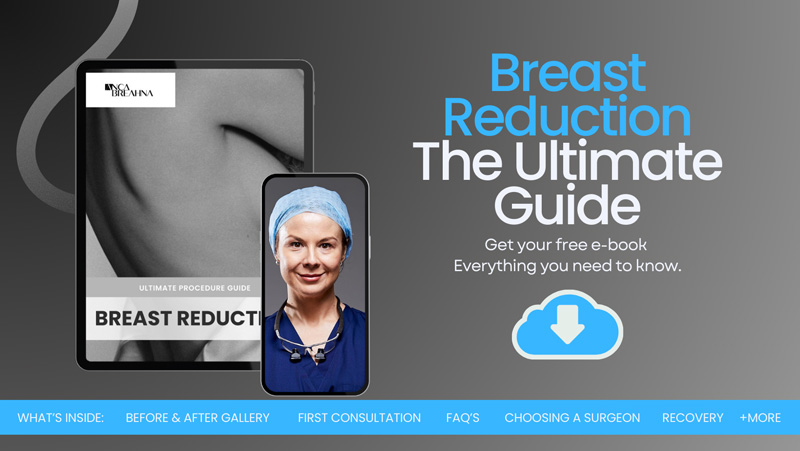
- The Rising Trend of Private Breast Reduction Surgery in UK
- Breast Reduction Guide
- The NHS and Breast Reduction Surgery
- NHS Criteria Based on BMI
- Possibility of Being Turned Away
- The Rise in Private Breast Reduction Surgeries
- Comparing NHS and Private Surgery Options
- NHS Surgery
- Private Surgery
- FAQs about the NHS and Breast Reduction Surgery
- Further Reading about Breast Reduction with Consultant Plastic Surgeon Anca Breahna
The Rising Trend of Private Breast Reduction Surgery in UK
Breast reduction surgery is a procedure many people turn to for relief from physical discomfort and to improve their overall quality of life. It involves reducing the size of the breasts, often to alleviate back and neck pain, skin irritation, and other issues caused by disproportionately large breasts. In recent years, there’s been a noticeable shift towards private breast reduction surgery in UK. More and more individuals are choosing private clinics over the National Health Service (NHS). One of the main reasons for this trend is the significant waiting times associated with the NHS. With the demand for such surgeries often outpacing the available resources, many find themselves waiting longer than expected for their procedure.
This delay can be frustrating and inconvenient, leading many to explore private options. In this blog, Chester Consultant Plastic Surgeon Anca Breahna will explore why this shift is happening and what it means for those considering breast reduction surgery. She will look at the differences between private and NHS routes, including factors like waiting times, costs, and the overall process.
Breast Reduction Guide

The NHS and Breast Reduction Surgery
If you’re considering breast reduction surgery through the NHS, it’s important to understand the process and what to expect. The NHS provides this surgery, but it’s not as straightforward as booking an appointment. There are specific steps and criteria you need to meet.
Firstly, you’ll need to see your GP. They will assess your physical and mental health to determine if you’re a suitable candidate for the surgery. The NHS has specific criteria for eligibility. These usually include experiencing physical discomfort like back and neck pain, skin problems due to large breasts, or psychological distress. They will also consider whether you’ve tried other treatments, like physiotherapy or weight loss, if applicable. An essential eligibility criteria is that your BMI should be less than 27 and stable for more than 12 months. You will also need to have been measured and fitted professionally with a suitable bra.
If you meet all eligibility criteria for procedures of low clinical priority you’ll be referred to a plastic surgeon who will assess you and if suitable for this surgery will place you on a waiting list. The waiting times for breast reduction surgery in the NHS can vary significantly across different regions in the UK. Generally, you might expect to wait several months to over a year. These times can be influenced by factors like the number of patients waiting and the overall demand for elective surgeries.
In recent times, the NHS has faced challenges that have impacted waiting times. Increased demand for healthcare services, budget constraints, and the recent global health crisis have all played a part in extending waiting periods for elective surgeries, including breast reduction.
NHS Criteria Based on BMI
The NHS typically requires patients to have a certain BMI to qualify for breast reduction surgery. This criterion is in place because a higher BMI can increase the risk of complications during and after surgery. It’s also based on the understanding that weight loss might naturally reduce breast size, potentially eliminating the need for surgery.
Generally, the NHS prefers a BMI that is within the range considered healthy, usually between 18.5 and 24.9. However, this can vary slightly depending on your specific circumstances and the policies of your local NHS trust. If your BMI is above the preferred range, your GP or specialist might advise you to try and lose weight before you can be considered for surgery.
A BMI within the recommended range is considered important for several reasons:
- Surgical Risk: Higher BMI can increase the risk of complications during surgery, such as infection or slower healing
- Surgical Outcomes: Achieving the best possible results from the surgery is more likely when you’re within a certain BMI range
- Overall Health: A healthy BMI is often indicative of better overall health, which can contribute to a smoother recovery
If your BMI is higher than the recommended range, it’s advisable to work with your GP to develop a plan for reaching a healthier weight. This might involve dietary changes, increased physical activity, or other lifestyle adjustments. Not only can this improve your eligibility for surgery, but it can also benefit your overall health.
Possibility of Being Turned Away
It’s important to be prepared for the possibility that you might be turned away. The NHS has to prioritise patients based on the severity of their symptoms and the potential benefits of the surgery. If your case is deemed less severe or if it’s believed that the surgery won’t significantly improve your quality of life, you might not be approved for the procedure.
This part of the process can be disheartening, but it’s a reality within the constraints of public healthcare. If you’re not eligible for NHS surgery, or if you prefer not to navigate the lengthy waiting times and uncertainty, private surgery becomes an alternative worth considering.
The Rise in Private Breast Reduction Surgeries
In recent years, there’s been a noticeable increase in the number of people opting for private breast reduction surgeries. While exact statistics vary, private healthcare providers have reported a significant uptick in these procedures. This trend is largely attributed to the long waiting times in the NHS, which can often extend to several months or even over a year.
One of the key reasons driving this shift is the desire for quicker access to the surgery. When you choose a private clinic, you typically face much shorter waiting times. In many cases, you can schedule your surgery within weeks of your initial consultation. This quicker turnaround is a major draw for those who are struggling with the physical discomfort and psychological impact of having large breasts.
Cost is another factor to consider. While private surgery is a paid option, unlike the NHS, many find that the benefits of having the surgery sooner outweigh the financial cost. Private healthcare also often offers more flexibility in terms of choosing your plastic surgeon and the hospital where the surgery will be performed.
Comparing NHS and Private Surgery Options
When you’re considering breast reduction surgery, it’s important to weigh the pros and cons of both NHS and private surgery options. Each path has its own set of benefits and drawbacks, and understanding these can help you make a more informed decision.
NHS Surgery
Pros:
- Cost: The most obvious advantage of the NHS is that the surgery is free at the point of use. You don’t have to worry about the financial burden of the procedure
- Quality of Care: The NHS has strict standards for patient care, ensuring you receive quality treatment
- Comprehensive Aftercare: Post-surgery aftercare is included, providing you with necessary follow-up appointments and support
Cons:
- Long Waiting Times: The biggest drawback is the waiting time, which can be lengthy and varies widely across the country
- Eligibility Criteria: Not everyone is eligible for breast reduction on the NHS. There are specific criteria you must meet, which can include physical discomfort and psychological distress
Private Surgery
Pros:
- Shorter Waiting Times: One of the main advantages is the reduced waiting time. You can often schedule surgery within weeks of your consultation
- Choice of Surgeon and Hospital: You have more control over choosing your surgeon and the location of your surgery
- Flexibility in Scheduling: Private surgery can be scheduled at a time that suits you, making it easier to fit around your personal and work life
Cons:
- Cost: The cost is a significant factor. Private surgery can be expensive, and it’s important to consider whether this is a feasible option for you
- Variability in Price and Quality: Prices and quality of care can vary between private providers, so you need to do thorough research
- Aftercare May Vary: While some private clinics offer comprehensive aftercare, others might not, or it may come at an additional cost
The choice between NHS and private surgery depends on your personal circumstances, including your financial situation, how quickly you need the surgery, and your preferences regarding the choice of plastic surgeon and hospital.
FAQs about the NHS and Breast Reduction Surgery
How do I know if I’m eligible for breast reduction surgery on the NHS?
Eligibility for breast reduction surgery on the NHS is based on several criteria, including the level of physical discomfort you experience, any associated health issues (like back pain or skin conditions), and the psychological impact. Your GP will assess your situation and refer you to a specialist who will make the final decision.
What is the typical waiting time for breast reduction surgery on the NHS?
Waiting times for breast reduction surgery on the NHS can vary significantly. It’s not uncommon for patients to wait several months to over a year, depending on factors like the demand in your area and the availability of specialists.
Will my BMI affect my eligibility for NHS breast reduction surgery?
Yes, your BMI is an important factor in determining your eligibility for breast reduction surgery on the NHS. A BMI within the healthy range (typically between 18.5 and 24.9) is usually preferred, as it can reduce surgical risks and improve outcomes.
What should I do if I’m not eligible for breast reduction surgery on the NHS?
If you’re not eligible for surgery on the NHS, you might consider private healthcare options. Alternatively, you can discuss with your GP other ways to manage your symptoms, such as physical therapy, lifestyle changes, or weight management if applicable.
Does the NHS cover all costs associated with breast reduction surgery?
Yes, if you are approved for breast reduction surgery on the NHS, all costs related to the surgery, including consultations, the procedure itself, and aftercare, are covered. However, it’s important to note that any additional cosmetic procedures not deemed medically necessary may not be covered.
Medical References
- Breast Reduction Surgery (Mayo Clinic) – https://www.mayoclinic.org/tests-procedures/breast-reduction-surgery/about/pac-20385246
- Breast Reduction (Cleveland Clinic) – https://my.clevelandclinic.org/health/treatments/11025-breast-reduction
- Breast Reduction (NCBI) – https://www.ncbi.nlm.nih.gov/books/NBK441974/
- Breast Reduction Surgery: Everything You Need to Know (Medical News Today) – https://www.medicalnewstoday.com/articles/327355
- Breast Reduction Surgery (WebMD) – https://www.webmd.com/beauty/cosmetic-procedures-breast-reduction-surgery
Further Reading about Breast Reduction with Consultant Plastic Surgeon Anca Breahna
-
- Read more about Internal Bra – A More Durable Breast Uplift Technique
- Read more about Breast Reduction
- Read more about Back, Shoulder and Neck Pain Caused by Large Breasts
- Read more about Breasts after Weight Loss
- Read more about Do I Need a Post Op Bra after Breast Surgery?
- Read more about Private Surgery vs NHS
- Read more about 10 Things to Consider Before a Breast Reduction


 Ms Anca Breahna, PhD, MSc, FEBOPRAS, FRCS (Plast) is a highly regarded Consultant Plastic Surgeon specialising in the field of Aesthetic and Reconstructive Plastic Surgery. Anca performs a range of
Ms Anca Breahna, PhD, MSc, FEBOPRAS, FRCS (Plast) is a highly regarded Consultant Plastic Surgeon specialising in the field of Aesthetic and Reconstructive Plastic Surgery. Anca performs a range of 